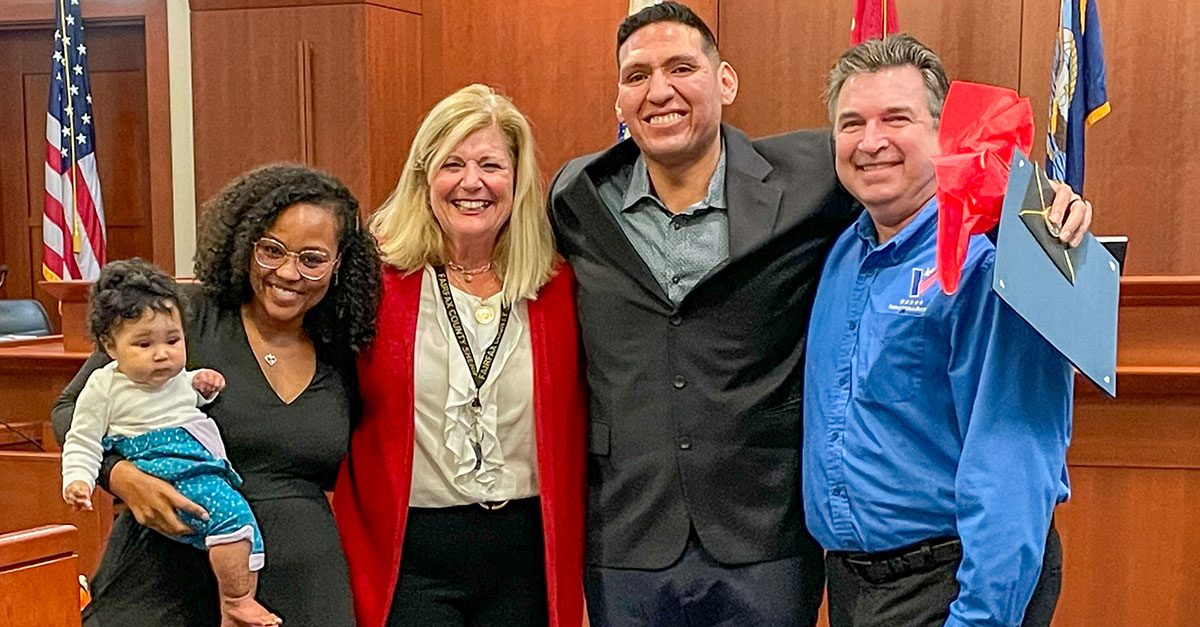Criminal behavior that results in charges can sometimes stem from the challenges associated with substance use and mental health issues. Often times, these behaviors occur when a substance use or mental health issue goes undiagnosed and untreated. To reduce these incidents and support the health and wellness of individuals in the community, the Fairfax-Falls Church Community Services Board (CSB) supports three specialty dockets in collaboration with, the Fairfax County Courts, the Office of the Fairfax Commonwealth’s Attorney (OCA), the Fairfax Office of the Public Defender, Virginia State Probation, Fairfax County Court Services, and the Fairfax County Sheriff’s Department. These programs offer individuals the opportunity to engage in behavioral health services as an alternative to incarceration.
The three specialty courts include Recovery Court, Veterans Treatment Docket, and the Mental Health Docket. According to the Adult Treatment Court Best Practice Standards, these courts should not be adversarial like the regular court system, but are collaborative spaces where prosecutors, defense, and a judge are all on the same side to provide defendants the help they need.
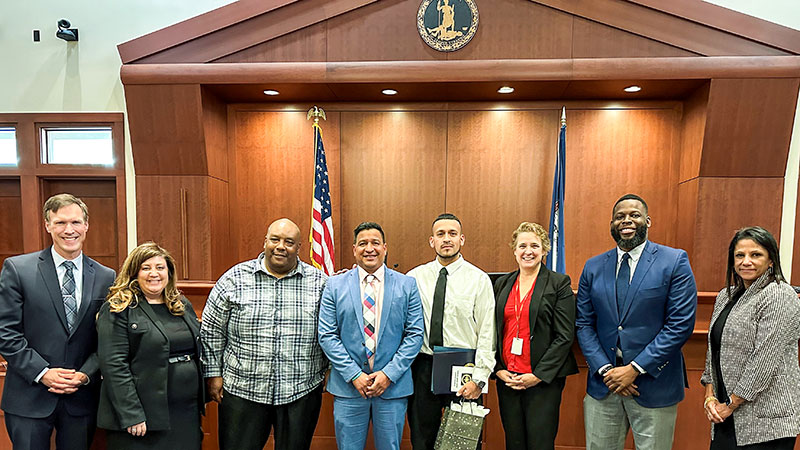
Specialty Dockets aim to reduce recidivism, improve positive client outcomes, enhance public safety, and empower participants to change their own lives through engaging in an evidence-based recovery journey. The CSB supports these dockets in multiple ways. They provide staff in the roles of Docket Coordinator (Behavioral Health Supervisor) and Treatment Coordinator (Behavioral Health Senior Clinician). The Docket Coordinator is the administrative lead of a docket team. One of the major roles of this position is to oversee the referral and entry process which includes determining eligibility through the use of evidence-based screening tools which determine both criminogenic risk and level of treatment need. To be eligible for most of the dockets an individual must have both high criminogenic risk and high treatment needs. The Treatment Coordinator serves as a care coordinator and liaison between the participant’s behavioral health treatment providers and the other agency team members including the judges. Both positions also provide case management support as needed as well as facilitate evidence-based groups such as MRT and Seeking Safety for docket participants. The Mental Health Docket also has a Behavioral Health Specialist I who provides skill building services and supports care coordination efforts. In addition to directly staffing the docket teams, the CSB acts as a treatment provider for many participants of the Specialty Dockets. Participants are involved in various CSB programs including residential treatment, Behavioral Health Outpatient Programs, the Addiction Medicine Clinic, Turning Point, Intensive Case Management and Assertive Community Treatment.
Who Qualifies for the Specialty Dockets?
- Individuals with charge(s) in Fairfax County.
- Event(s) that lead to the charge(s) were the result of symptoms associated with an underlying substance use disorder (SUD) or serious mental illness (SMI).
- Individuals assessed to meet high risk of criminal recidivism and high treatment needs by a validated assessment tool. (The Veterans Treatment Docket also has a low criminogenic risk/high treatment need track.)
- Office of the Commonwealth Attorney approves for legal eligibility.
- Individuals must be willing to undergo intensive treatment and supervision for their SUD or SMI as opposed to following the traditional approach to the legal process in exchange for reduced or dismissed charges at program completion.
- For Recovery Court and Mental Health Dockets, must be a Fairfax County Resident.
Recovery Court
The Recovery Court launched in Circuit Court in 2018 and expanded with a second track in August 2024. The program now includes two age-specific treatment tracks to create a more relevant group experience for participants: the 18-25-Year-Old Track and the 26-Year-Old and Older Track. This program has a minimum requirement of 14 months to complete the five phases of the program though the length may vary depending on individual progress and the choices made during the program. The average length of treatment in the Recovery Court is 18 months. Participants must also be working on and making progress towards individual treatment goals within each phase. The Recovery Court has served 90 individuals and 29 of those individuals have successfully completed the program.
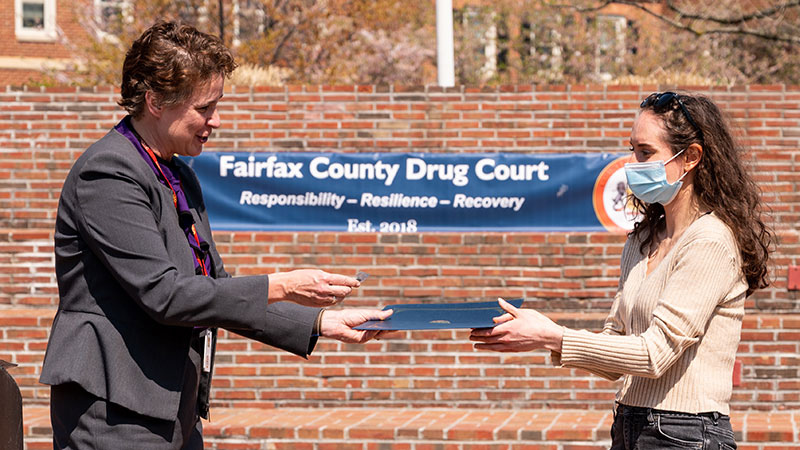
Mental Health Docket
The Mental Health Docket or Mental Health Court was established in July 2019. In order to be eligible to participate in this docket, an individual must be diagnosed with a serious mental illness as defined by DSM-5 and determined to show a likely connection between the treatment-based mental illness and their criminal behavior. The program length ranges from 12 to 24 months but can take longer depending on treatment-based progress. There are four phases, and the individual must meet individualized treatment-based goals in order to advance through the phases. Since its launch, the Mental Health Docket has served 71 total individuals, 37 of whom have successfully completed the program.
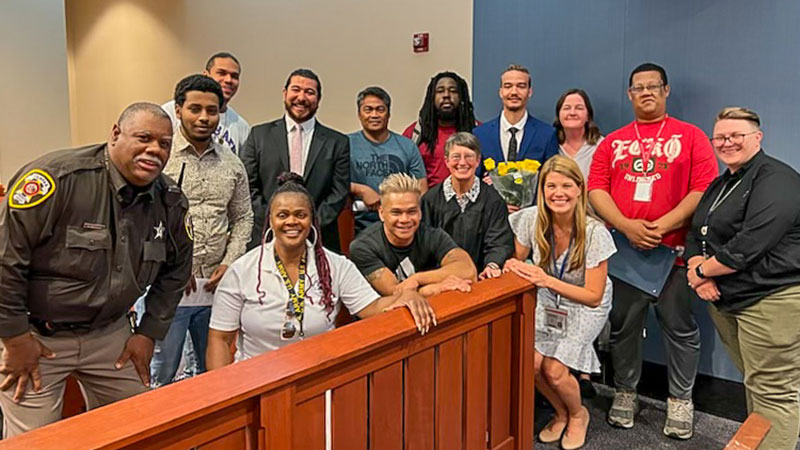
Veterans Treatment Docket
The Veterans Treatment Docket was established in February 2015 to serve eligible individuals identified as high risk and high need. Over time, the treatment team noticed that there was a portion of the population that would benefit from services associated with the docket but were not meeting the high risk – high need qualification. In July 2022, the Low Risk – High Need track was started in an effort to increase the reach to those individuals who qualify. To participate in the Veterans Treatment Docket, an individual must be discharged from any branch of the United States military, the reserves, or the National Guard. Additionally, they must meet criteria for a major mental health and/or substance use disorder. Since its inception, the Veterans Treatment Docket has served a total of 93 individuals, with 65 successfully completing the program.
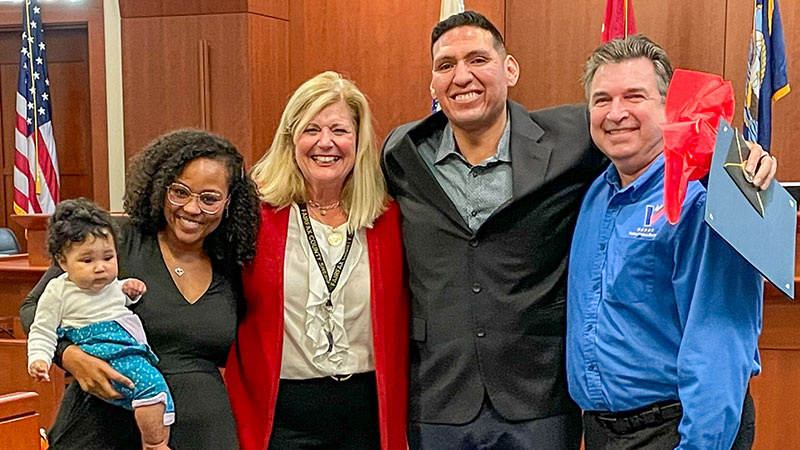
Attend a Docket Graduation
Each of the Dockets host graduation ceremonies that are open to the public and feature recognition of graduates, guest speakers, and light refreshments. The Veterans Treatment Docket will be hosting a graduation on Thursday, June 12, 2025, at 2:00 p.m. in Courtroom 5J of the Fairfax County Courthouse, featuring Brigadier General Stephen D. Mundt U.S. Army (Ret.) as the guest speaker. To stay up to date on future graduations, follow the CSB on social media.
To Access CSB Services
To access any of the above-mentioned services, call 703-383-8500 (TTY 711). Multilingual staff are available at CSB locations, including at community-based sites and youth medication-assisted treatment clinics. Staff at the CSB Entry & Referral Call Center can take calls in English and Spanish, and language translation services for other languages are available by telephone when needed.
-
For CSB Non-Emergency Behavioral Health Services, call CSB Entry & Referral at 703-383-8500 TTY 771, Monday-Thursday, 9:00 a.m. to 5:00 p.m., and Friday, 10:30 a.m. to 5:00 p.m. You may also walk-in at the Sharon Bulova Center for Community Health Monday-Thursday 8:00 a.m. to 3:00 p.m., and Friday 10:00 a.m. to 3:00 p.m.
-
For emergency mental health or substance use services, walk-in services are available 24/7 at the Sharon Bulova Center for Community Health or call 703-573-5679 TTY 711.
-
If someone with a developmental disability is experiencing a mental health or substance abuse crisis, call REACH, a 24/7 regional crisis stabilization and crisis prevention service for children, youth and adults with developmental disabilities, at 855-897-8278.
-
If you or someone you know is experiencing a substance use crisis, call the Fairfax Detoxification Center 24/7 at 703-502-7000, TTY 703-322-9080.
For media inquiries, contact CSBCommunications@fairfaxcounty.gov.


